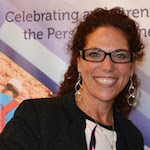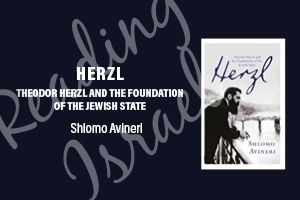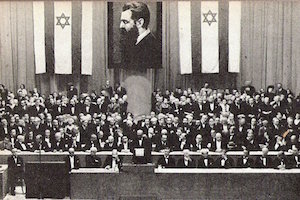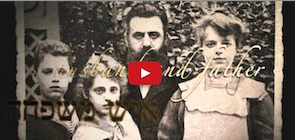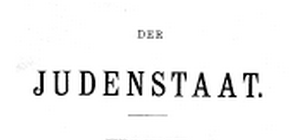Book Review of Theodore Herzl and the foundation of the Jewish State by Shlomo Avineri
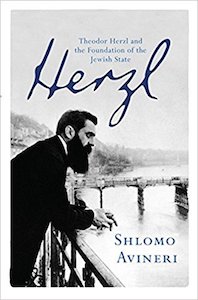
Theodor Herzl began his public life at age 35 and died at the age of 44. In those nine years, Shlomo Avineri writes, Theodore Herzl transformed the idea of a Jewish state “from one bandied about by a small coterie of educated but marginal Jews to an item on the international political agenda, a position which it keeps to this day.”
Based on an analysis of Herzl’s diaries, Avineri highlights the role of Antisemtism as one of several reasons behind his entrance as the “father of modern political Zionism” for which he has since become known. Avineri emphasizes as well the influence of the political crisis of the Austro-Hungarian Habsburg Empire, torn apart by contending national movements, which convinced Herzl of the need for a Jewish political entity to come into being. Herzl’s dream emerges from a vision of what is possible, rather than solely as a reaction to negative contemporary social or political circumstances. For Avineri, Herzl’s diaries shed light on his unique vision for a future freedom for the world’s Jews that was both practical and personal at the same time.
The social realities for Jews at the time were, according to some, at their peak in the last 1800s, with more and more Jews being emancipated from the confines of secondary status in their home communities. Assimilation, however, was not sufficient to address the continued tensions between Jews and non-Jews that could only be alleviated by grating Jews the ultimate freedom: to live in their own land, with equal rights and a penchant for fostering advancement and progress such as they had contributed time and again in each country in which they lived.
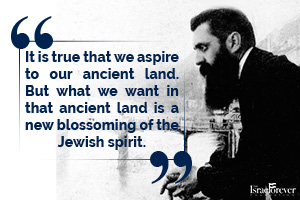
Avineri translates Herzl into a common man that any Jew today might relate to. Between false starts in his career and agenda, character flaws, Herzl comes to recognize his misdirected initial view that any other land could even remotely replace Palestine in the Land of Israel as the potential site of a future Jewish sovereign state. Avineri thus enters into the mere 9 years of activity as if an acquaintance on the journey, observing both the effectiveness and depth of vision alongside Herzl’s personal confrontation with the numerous challenges involved in expanding the love of Zion already ingrained in the Jewish psyche and tradition into a practical and productive political agenda.
An avid researcher, impassioned writer, and emeritus professor of political science at the Hebrew University of Jerusalem, Shlomo Aviner aimed “to transform the canonical image of a larger-than-life person – ‘the Visionary of the State’ in common Israeli parlance – into a real, living human being and thus extricate him from the mythological qualities connected with his name.” Examining how Herzl transformed his vision into diplmany efforts, Avineri taps into his own experience as director general of the Israeli Foreign Ministry, demonstrating just how thoroughly he grasps the game involved in advancing the Jewish nationalist goal in international forums.
Avineri credits Herzl with the “phenomenal achievement” of transforming the idea of a Jewish state “from one bandied about by a small coterie of educated but marginal Jews to an item on the international political agenda, a position which it keeps to this day.” In his efforts to gain international support for a Jewish state, Herzl met with the Ottoman Sultan, the German Emperor Wilhelm II, Pope Pius X, British, Russian and German ministers, as well as an enormous number of other government and public opinion leaders of most European countries.
By the time of his early death in 1904 at the age of 44, Herzl had succeeded in taking Ahavat Tzion out of the confines of the Jewish heart and putting Zionism on the map of world politics. No longer an esoteric idea held by a small group of Jewish theologians and intellectuals, he subsequently wrote his Jewish State in 1895 and then convened the first Zionist Congress in Basel in 1897 which established the World Zionist Organization with its representative and elected institutions that in turn became the foundation for Israel's democratic political system..
To the older generation, Herzl became a quasi-mythical figure to be admired. Just as his portrait hung on the wall behind David Ben Gurion when he declared the independence of the Jewish state in the Tel Aviv Museum on 14 May 1948, and still today in the Knesset, Israel’s Parliament, his image is one of a charismatic hero whose story of romance with a dream for the Jews was transformed into reality through the commitment to the dream he had inspired in subsequent generations.
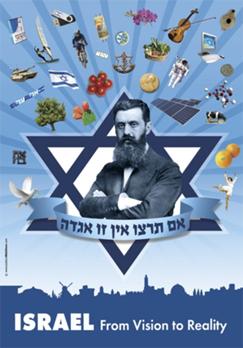
To the younger generation, Herzl remains a historical figure of little consequence, making it even more essential that we transmit a better understanding of his leadership, his vision, and our collective responsibility to continue to fulfill his dream. Young Jews today may critize Herzl for his naive liberalism and for not anticipating the birth of a Palestinian Arab national consciousness,” but Avineri stresses recognition that, in Herzl’s day, no such movement existed. Rather, he foresaw the existing population of Palestine as equals, “partners in citizenship” who would welcome the values and democracy that would be an integral part of any Jewish State. While a large percentage of Israel’s Arab population welcomes their identity and the equal rights they enjoy as citizens of Israel, we see that there is still much to be done to reduce the hate education and incitement to terror before they will become the true partners in citizenship that all of Israel and the Jewish people wish to see fulfilled.
Although Herzl would not live to see it, the Balfour Declaration in 1917 was a repeat of the same vision and hope for the Jewish nationalist dream “wrapped in the colors of the British Empire.” The real impact of reading Avineri’s portrait of this inspirational Jewish leader will be evident in the deepening of understanding of all that went in to the fulfillment of a dream that was shared by so many Jews since the exile to today, and, moreover, how many young Jews might aspire to follow in his footsteps.
DISCUSSION QUESTIONS
- Contrary to popular mythology regarding Herzl’s life, Avineri emphasizes that it was his reading of Eugen Dühring’s 1881 essay, “The Jewish Question as a Racial, Moral, and Cultural Issue,” which outlined the inferiority of Jews, that convinced Herzl of the failure of Jewish emancipation. Why does it matter what was the impetus behind Herzl’s initiation into Zionist activity?
- Herzl, like most Diaspora Jews both then and now, did not speak Hebrew: “Who amongst us,” he mused, “has a sufficient acquaintance with Hebrew to ask for a railway-ticket in that language?” How important is having a common language that connects all Jews around the world? It didn’t hinder Herzl’s success then, but would it now?
- When Herzl came of age, Jews had moved from the margins of Western and Central European society to the pinnacles of achievement in the professions and arts. Yet their very success “was seen as threatening,” especially in German-speaking lands, leading to the first tremors of anti-Semitism as early as 1817. How does this relate to the contemporary reality of Jews living around the world and the recent rise of Antisemitism? How is the current response to this rise of hate towards Jews and Israel different than it was at that time?
- Before writing off Herzl’s vision as “patronising colonialism,” Shlomo Avineri emphasizes that one ought to pause on the question of Jewish identity and nationalist vision in relation to the other potential citizens. As Herzl wrote, “we do not ask what race or religion a man belongs to. If he is a human being that is enough for us.” How can Israel’s efforts to live up to Herzl’s message of social equality be recognized in the ongoing battle against lies of apartheid and human rights violations?
- After debating other territorial options, Avineri highlights Herzl’s epiphany that “Palestine is our never-to-be-forgotten homeland” as turning point. How can this statement, as well as the continuous recognition of “Palestine” as the Jewish land for thousands of years even during our exile, help those today who are confused as to the relevance of the Land of Israel to Jewish life and identity?
- Avineri states in his book, “A more realistic man would have given up,” What do you think drove Herzl to continue working towards what at the time seemed like a wholly unrealistic dream?
- Herzl worked tirelessly to meet with world leaders, bringing attention to the Jewish nationalist dream and our human rights. How might his efforts 120 years ago influenced diplomacy efforts today?
- Herzl was a reporter - fairly well known in Jewish circles. He was also an aspiring novelist and playwright. What can we as a Jewish people learn from Avineri’s portrait of Herzl that can be an inspiration to young Jews looking to become involved in diplomacy, leadership and advocacy?

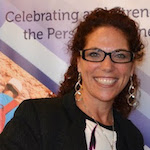
Dr. Elana Yael Heideman, Executive Director of The Israel Forever Foundation, is a dynamic and passionate educator who works creatively and collaboratively in developing content and programming to deepen and activate the personal connection to Israel for Diaspora Jews. Elana’s extensive experience in public speaking, educational consulting and analytic research and writing has served to advance her vision of Israel-inspired Jewish identity that incorporates the relevance of the Holocaust, Antisemitism and Zionism to contemporary issues faced throughout the Jewish world in a continuous effort to facilitate dialogue and build bridges between the past, present and future.
Recommended:
READING ISRAEL BOOK CLUB
Get Started Reading Israel today!
About the Author
